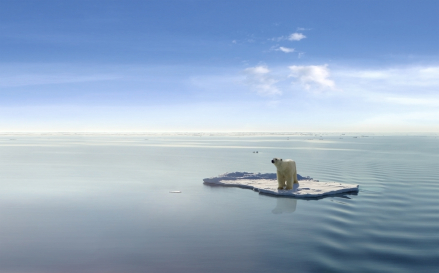Global Warming Effects
Global warming effects are not only limited to earth’s surface temperature but to overall climate change. Global warming is affecting and will continue to affect the overall ecosystem of earth including biology, hydrology, winds, rains and temperature and much more. Some such worst global warming effects are discussed here:
Global Warming Effects
Polar Regions, Polar Bears and Global
Warming
:
The planet is warming
and the effects of it are undeniable in certain places specially the sensitive
Polar Regions. Scientists agree that due to rise in temperature polar ice caps,
ice sheet covering of the sea and mountain glaciers are melting rapidly. The
animals in Polar Regions specially the polar bear are adversely being affected
by the global warming as they are losing their ice habitats rapidly. Polar bear
live on the Arctic ice sheet over the sea most of the time than on the land.
Their sea ice platforms are moving apart due to melting. Their population size
is decreasing as hunting opportunities are decreasing and food scarcity is
increasing due to declining sea population. As climate change melts sea ice,
the U.S. Geological Survey projects that two thirds of polar bears will
disappear by 2050 (http://www.nwf.org). In
2008, the polar bear has been listed as a threatened species under the
Endangered Species Act mainly because of the disappearing of its primary
habitat that is the sea ice sheet.

Polar bear Global warming
Severe and Frequent Flooding
Due to temperature increase in the ocean, thermal expansion will take
place and sea surface will rise. In addition, melting glacier and ice caps will
continue to add more water to the ocean and cause the sea level to rise
further. It is predicted that with a meter increase in sea level (3 ft) a
considerable section of U.S. Eastern
seaboard would submerge and with a further increase to 1.5 meter (5 ft), one
sixth of Bangladesh could be lost permanently.
More Destructive Storms, Hurricanes, Cyclones and Tsunamis
Increase temperature of the ocean causes more evaporation and more rise
in sea level. These along with the change of climate pattern will increase the
probability of more frequent and deadlier natural disasters like cyclones, hurricanes
and tsunamis.
Increase in Wild and Forest Fires
As the earth surface keeps getting warmer, proportion of dry foliage and
land covers increases in the forest and wild areas; making them more vulnerable
to frequent and destructive wildfires.
Desertification, Droughts and Increase Occurrence of Heat Wave
With the increase temperature of the earth; more loss of vegetation,
desertification and soil surface aggravation will result. Severe droughts are not
only expected in Africa but also in Europe. Heat wave will be more intense and
frequents globally.
Lost in Biodiversity and Habitats
Increase temperature of earth surface and ocean will adversely affect
its population by destroying biodiversity and links among food chains. Oceanic
acidification due to climate change and warmer surface temperature will
endanger the oceanic phytoplankton as well as the coral reefs. As coral reefs
are very sensitive to temperature change and pollution; many of them have
already been observed to be affected and damaged.
Scarcity of Food and Water Supply
Warmer temperature will increase droughts and loss of soil fertility and
affect the food crop production everywhere. The fresh water supply will also
diminish in countries where it is already scarce.
Negative Economic Consequences
The increase in natural disasters like flood, cyclone, tsunami etc. will
have direct negative impact on the economy of the various nations. More
resources will be required to produce foods, providing water supply need and
maintaining public health.
A summary of global warming effect is shown in the
following video:
Discover more on Global Warming Effects
Go back to The EcoAmbassador Home
Total Visits to Site: